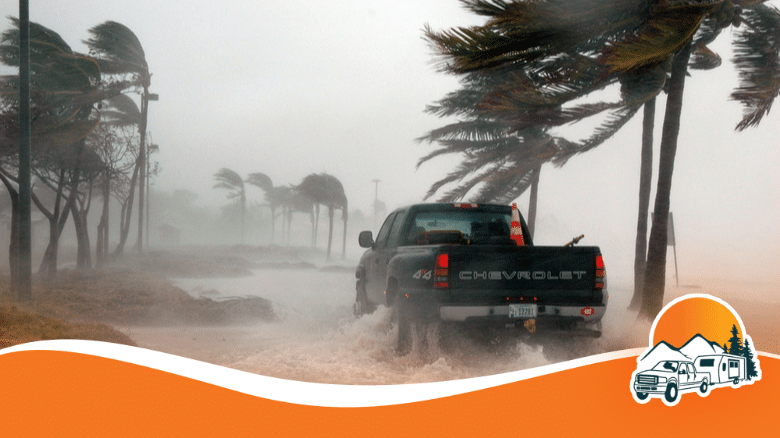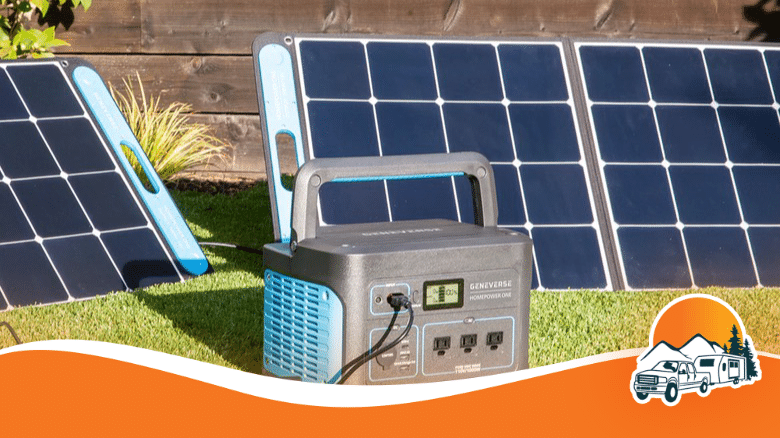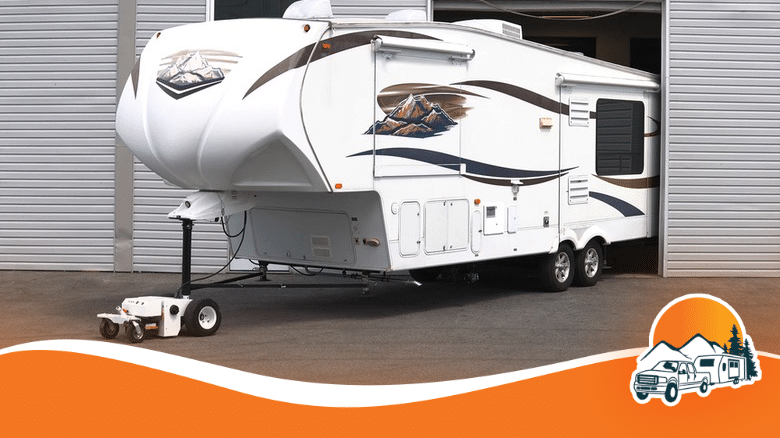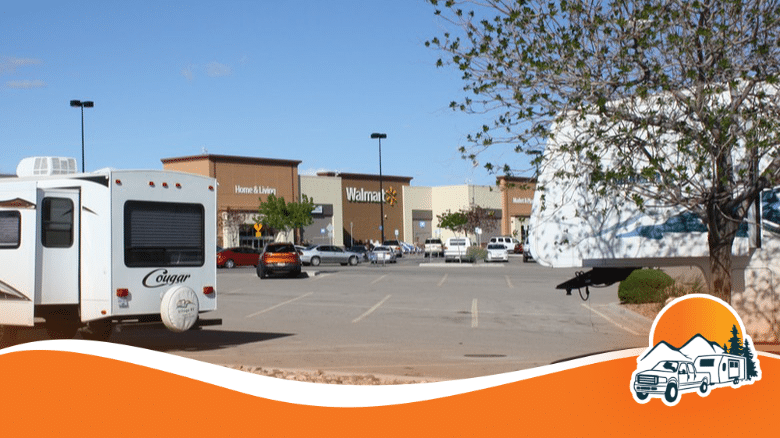There’s no feeling quite like being on the open road in an RV. The wind in your hair, the sun on your face, and the sense of freedom that comes with hitting the open highway. However, there is such a thing as too much of a good thing. When wind speeds become too high, driving an RV can become dangerous.

Gusts can cause the vehicle to veer off course, and strong crosswinds can make it difficult to maintain control. That said, high winds can create hazardous conditions on the road, such as blowing debris and toppled trees.
This article discusses everything you need to know about driving your RV in heavy winds. So without further ado, let’s get started!
What Happens if You Drive Your RV in Heavy Winds?
Depending on the size and weight of your RV, driving in heavy winds can be dangerous. If your RV is lightweight and un-aerodynamic, the wind can easily push it around on the road. This can make it difficult to control, and you may end up in a ditch or off the road altogether.
If your RV is larger and heavier, it will be more stable in the wind, but you still need to be careful. Strong crosswinds can cause you to lose control of your steering, and gusts can cause your RV to swerve suddenly. In either case, it’s important to slow down and take extra care when driving in high winds.
5 Tips for Driving an RV in Heavy Winds
Any driver knows that wind can be a powerful force, but when you’re behind the wheel of a large RV, it can be especially daunting. Here are a few tips to help you stay safe when driving in heavy winds:
#1 Drive Slowly and Carefully
Anyone who has ever driven an RV in heavy winds knows it can be challenging. The vehicle is large and bulky, and the wind can push it around on the road. This can make it difficult to control and even lead to accidents. That’s why driving carefully and slowly when the wind blows is so important. Here are some tips for driving an RV in windy conditions:
- First, make sure that all of your cargo is securely fastened. Loose items can become flying projectiles in strong winds, so keeping them secured is important.
- Avoid driving in crosswinds if possible. These can be utterly dangerous, making it tough to stay on track with an RV.
- If you must drive in a crosswind, take extra care to maintain control of the vehicle.
#2 Check the Weather When Planning Your Trip
If you’ve been driving in an RV during a windstorm, you know it can be a harrowing experience. The wind can push your RV around on the road, making it difficult to keep control. And if you run into an accident, the damage can be significant.
So it’s important to check the weather forecast before embarking on an RV trip. If there is a chance of high winds, it’s best to postpone your trip or choose a different route.
#3 Use a Weight Distribution Hitch
In extreme cases, wind can even cause your RV to tip over. To help prevent this from happening, you should use a weight-distribution hitch when driving in heavy winds. A weight distribution hitch helps to distribute the weight of your RV evenly across all four tires.
This helps to prevent your RV from being pulled to one side by the wind. Additionally, a weight distribution hitch helps to keep your RV more stable on the road, making it less likely to tip over in high winds.
#4 Drive With Both Hands on the Wheel
Experiencing heavy winds while driving an RV can be discouraging, to say the least. Not only are RVs larger and heavier than most vehicles on the road, but they also have a higher center of gravity.
This combination can make them particularly susceptible to being pushed around by strong winds. However, there are a few things that you can do to help keep your RV on the road in heavy winds.
First, make sure that you are driving with both hands on the wheel. This will give you more control over the vehicle and help to keep it stable. Additionally, reduce your speed and give yourself plenty of space to brake. And finally, be sure to keep an eye on any objects that could potentially blow into your path.
#5 Be Cautious While Driving on Bridges and Overpasses
The last thing you want is for your vehicle to be blown off the road. That’s why it’s vital to be extra careful when driving on bridges and overpasses.
These structures are particularly vulnerable to high winds, so it’s important to reduce your speed and be prepared for wind gusts. If possible, avoid driving on bridges and overpasses during periods of high wind. If you must drive on one, take your time and be extra cautious.
Can Wind Flip an RV?
If you have watched videos of massive RVs flipping over in high winds, you would know that it’s certainly a scary sight. But can wind actually flip an RV? The answer may surprise you.
It turns out that wind can indeed flip an RV, but it takes quite a bit of force. For an RV to be flipped by the wind, the gust must be strong enough to lift the entire vehicle off the ground. This is no easy feat, as RVs are typically heavy and bulky.
Having said that, the gust must be sustained long enough to carry the RV over. This is why most instances of wind-flipped RVs occur during hurricanes or other severe weather events.
Of course, this doesn’t mean that you should take your RV out in high winds lightly. Even if the risk of being flipped is relatively low, strong winds can still cause serious damage to your vehicle. It’s always best to err on the side of caution and avoid driving in high winds whenever possible.
What Are Wind Restrictions When Driving RV In High Winds?
Being on the road in an RV during high winds can be dangerous. Most states have wind restrictions in place when driving an RV. The mph limit varies from state to state, but typically it is between 45 and 55. Driving faster than the recommended limit can put you and your passengers at risk.
Heavy rains can reduce visibility and make it difficult to control the vehicle. If you are driving an RV in high winds, be sure to stay alert and watch for potential hazards.
Stay Safe While Driving an RV in High Winds
Driving an RV can be a challenge in high winds. The first thing you need to do is secure your RV. Make sure all doors and windows are closed and locked. This video perfectly depicts how you can stay safe on the go.
If you have an awning, ensure it is rolled up and secured. Chairs, tables, and other loose items should be stored inside the RV.
Once your RV is secured, it’s time to hit the road. But even with a secure RV, you still need to be aware of some things while driving in high winds. For starters , avoid crossing bridges or driving over high passes if possible. If you must cross a bridge or pass, go slow and use extra caution.
Additionally, keep your speed down. High winds can make it difficult to control your RV, so it’s important to slow down and take your time. Furthermore, be aware of other vehicles on the road. In high winds, cars and trucks can drift into your lane. Be prepared to take evasive action if necessary.
FAQs
Here are a few frequently asked questions about driving an RV in strong winds.
Can a Camper Tip Over When Parked?
While it is possible for a camper to tip over while parked, it is not likely. Campers are designed to be stable when parked; properly leveling the camper can help prevent tipping.
However, if the ground is soft or there are high winds, the camper could still tip over. If you are concerned about your camper tipping over, it is best to check with the manufacturer or a certified RV technician.
Is It Safe To Drive in 15 Mph Winds?
Generally, it is safe to drive in winds up to 15 mph. However, if the winds are gusty or blowing debris is likely, it is best to avoid driving.
High winds can make it difficult to control the RV, and debris can cause serious damage. If you must drive in high winds, be sure to go slowly and be extra cautious.
Conclusion
So when is it too windy to drive an RV? Of course, if the wind is strong enough to push the RV, it’s probably too windy. If the wind is so strong that it causes the RV to rock back and forth, then it’s definitely too windy. And if the wind is so strong that it actually lifts the RV off the ground, then…well, that’s probably a sign that you should find somewhere to take shelter!
So use your best judgment and err on the side of caution when deciding whether or not to hit the road in your RV. After all, it’s better to be safe than sorry.







